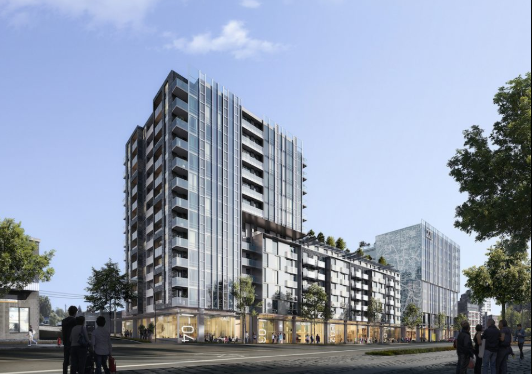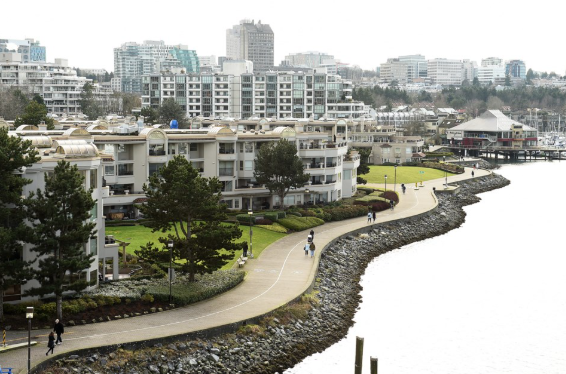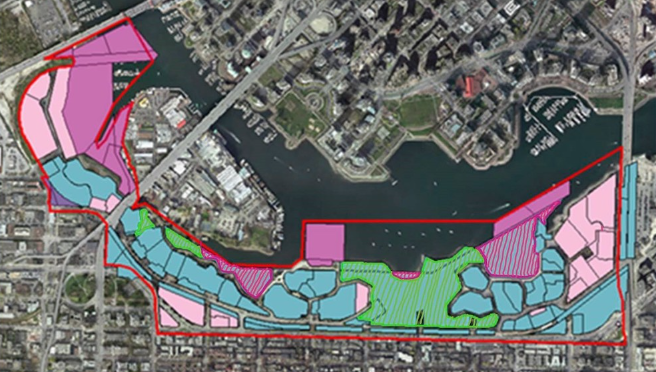False Creek South — a unique waterfront neighbourhood nestled between the Cambie and Burrard Street bridges — is at the heart of one of Vancouver’s most consequential planning processes. With expiring land leases and mounting pressure to address the city’s housing affordability crisis, the City of Vancouver is revisiting the future of this 55-hectare community it helped pioneer in the 1970s.
Once a progressive experiment in urban planning, False Creek South may soon evolve again — this time to serve a new generation of Vancouverites while addressing modern challenges like climate resilience, social equity, and housing need.
A Legacy Community at a Crossroads
False Creek South was transformed from an industrial brownfield into a mixed-tenure neighbourhood that became a global model for inclusive city building. Today, however, the community’s future is shadowed by the looming expiration of long-term land leases issued by the City during the 1970s and 1980s. Roughly 1,800 homes sit on City-owned land, and most leases will expire between 2036 and 2046 — with some co-ops facing earlier deadlines.
This lease uncertainty has created growing anxiety for current residents. Many of them helped build the tight-knit, mixed-income community, and they now face a future where their tenure — and the neighbourhood’s identity — may be reshaped.
In 2017, the City launched a formal planning process to consider the long-term use of its 80 acres of property in False Creek South, managed under its Property Endowment Fund. The goal: to chart a sustainable and inclusive future while also addressing Vancouver’s wider housing crisis.



*Photos by City of Vancouver
A Community Conversation, Paused but Not Forgotten
The first phase of public engagement ran from 2017 to 2018 and drew input from over 1,800 participants. Residents, planners, and civic stakeholders weighed in on housing, transportation, sustainability, and the character of the neighbourhood. The result was a set of provisional planning principles and a vision for “incremental growth” — a concept supporting gradual redevelopment while retaining community values.
But when it became clear that lease negotiations were too complex to resolve in parallel, detailed planning was put on hold. In 2021, the City revisited the conversation through a broader engagement effort to explore how its lands — including those in False Creek South — could help meet city-wide priorities.
Public feedback confirmed strong support for exploring affordable housing options on City-owned lands. A majority of respondents — including 63% of False Creek South residents and 80% of the general public surveyed — endorsed the idea of redevelopment that delivers affordability, sustainability, and equity.
Yet, key differences also emerged. Local residents expressed greater concern about lease clarity and were more hesitant about introducing additional affordable or rental housing types compared to respondents city-wide. They championed maintaining the original 1/3 mix of co-op, non-market rental, and leasehold strata, highlighting the community’s social fabric and internal subsidies provided by co-ops.
A Vision for the Future
While full planning remains paused pending lease negotiations, the City’s provisional vision outlines a renewed False Creek South that is resilient, inclusive, and connected. Ten guiding principles set the stage for a neighbourhood that preserves its legacy while welcoming thoughtful change. These include:
Maintaining affordability and social diversity
Expanding housing options for families, seniors, and essential workers
Planning for climate change and shoreline stability
Enhancing mobility through cycling, walking, and transit upgrades
Strengthening community amenities and green spaces
Stakeholders also stressed the importance of responsible financial planning, suggesting that market housing revenue could help fund affordable and non-market homes — a point of agreement among city-wide respondents but met with some caution from locals.
Challenges Ahead
Despite broad agreement on the neighbourhood’s potential role in addressing Vancouver’s housing needs, challenges persist. Lease expiry timelines create an urgent need for clarity. Residents worry about displacement and losing the community they’ve built. And differing views on density, building types, and the pace of change pose ongoing tensions.
Still, many see this as an opportunity — to renew a landmark neighbourhood while honouring its foundational values.
Looking Ahead
With City Council directing staff to resume formal planning when lease issues are resolved, the future of False Creek South remains an open question. But one thing is clear: the decisions made here will ripple far beyond its shores.
Curious how the False Creek South redevelopment could reshape the future of Vancouver’s core? We’re keeping a close eye on this process so our clients and community stay ahead of what’s next. Want to be one of them?

Comments:
Post Your Comment: